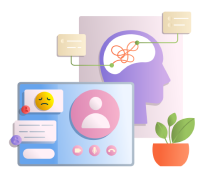Welcome to Serene Mind, where we understand the importance of mental well-being.
Our individual therapy services are designed to provide you with a safe space to explore your thoughts and emotions, and to support you on your journey to inner peace and clarity.
Our Approach
Our approach to individual therapy is rooted in empathy, respect, and collaboration. We work closely with you to develop a customized treatment plan that meets your unique needs and goals. Through evidence-based techniques and therapeutic modalities, we help you gain insight, build coping skills, and make positive changes in your life. Whether you are seeking support for anxiety, depression, trauma, relationship issues, or any other challenge, we are here to help you navigate your journey towards healing and growth. Your well-being is our priority, and we are dedicated to empowering you to live a more fulfilling and balanced life.
Benefits of our individual therapy service
Improved Mental Health and Well-being
Individual therapy enables individuals to tackle mental health issues like depression, anxiety, and trauma. Therapists offer a secure, confidential setting to delve into thoughts and emotions, fostering better mental health results.
Reduced Stress and Anxiety
We equip each individual with strategies to manage stress and anxiety. Therapists assist in identifying triggers and fostering healthier responses, ultimately diminishing stress and anxiety levels gradually.
Enhanced Coping Mechanisms
We provide you with practical coping skills to handle life's challenges better. These include mindfulness, cognitive-behavioral techniques, relaxation exercises, and communication skills, among others.
Increased Self-awareness and Confidence
By reflecting and introspecting, individuals develop an understanding of themselves, emotions, and behavior patterns. This promotes personal growth and confidence, nurturing a stronger sense of identity and purpose.
Why Choose Serene for Individual Therapy?
Tailored to individual needs, preferences, and personality.
Personalised Approach
Diverse Techniques
Utilizes various therapeutic approaches like cognitive-behavioral therapy, psychodynamic therapy, and humanistic therapy.
Focus on fostering self-awareness, self-esteem, coping skills, and problem-solving abilities.

Skill Development
Versatility
Adaptable for various issues, including anxiety, depression, stress, addiction, and trauma


Emotional Expression
Allows individuals to express emotions freely and constructively.
Flexibility
Can be short-term or long-term based on client goals and progress.
Confidentiality
Provides a safe and confidential space for clients to explore their thoughts and feelings.
Encourages clients to take an active role in their own healing and growth.
Empowerment
Effective for crisis situations, providing immediate support and coping strategies.
Crisis Intervention
Frequently Asked Questions (FAQ)
1What is individual therapy?
Individual therapy, also known as counseling or psychotherapy, is a collaborative process between a therapist and a client aimed at addressing personal challenges, improving mental health, and enhancing overall well-being. It provides a safe and confidential space for individuals to explore their thoughts, emotions, and behaviors in order to achieve personal growth and healing.
2What can I expect from individual therapy sessions?
In individual therapy sessions, you can expect to engage in open and honest conversations with a trained therapist who will listen attentively and provide support without judgment. Together, you and your therapist will explore your concerns, set goals, and work towards developing coping strategies and solutions to overcome obstacles.
3How long are individual therapy sessions?
Individual therapy sessions typically last between 45 to 60 minutes, although session lengths may vary depending on the therapist's practice and the needs of the client. Some therapists offer extended sessions for deeper exploration or shorter sessions for specific concerns.
4How often should I attend individual therapy sessions?
The frequency of individual therapy sessions varies depending on your unique needs and treatment goals. Initially, sessions may occur weekly or biweekly to establish rapport and momentum. As progress is made, sessions may be spaced further apart. Your therapist will collaborate with you to determine the optimal frequency of sessions.
5What issues can individual therapy help with?
Individual therapy can address a wide range of issues, including but not limited to depression, anxiety, stress, trauma, relationship difficulties, grief and loss, self-esteem issues, life transitions, and personal growth. Therapists utilize various therapeutic approaches and techniques to tailor treatment to your specific concerns.
6How do I know if individual therapy is right for me?
Individual therapy may be beneficial if you are experiencing emotional distress, struggling to cope with life's challenges, feeling stuck or overwhelmed, or seeking personal growth and self-discovery. If you're unsure whether individual therapy is right for you, consider scheduling an initial consultation with a therapist to discuss your concerns and explore potential treatment options.
